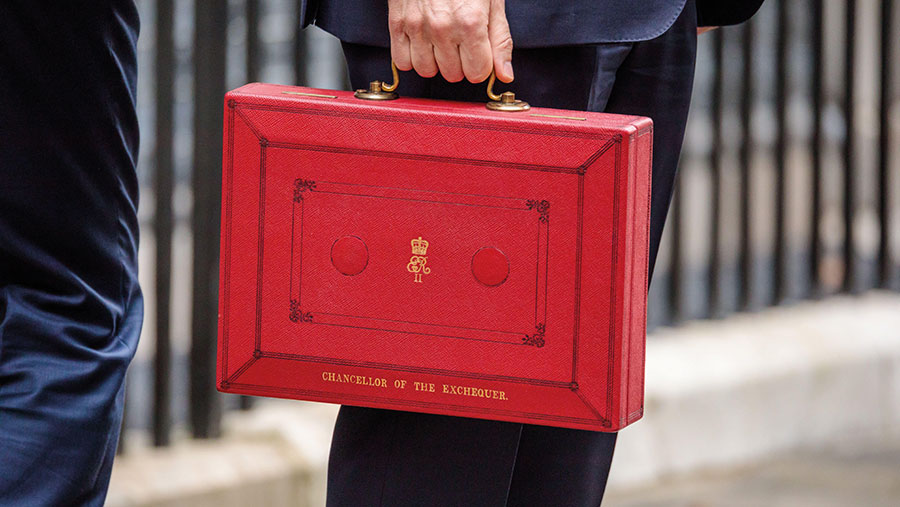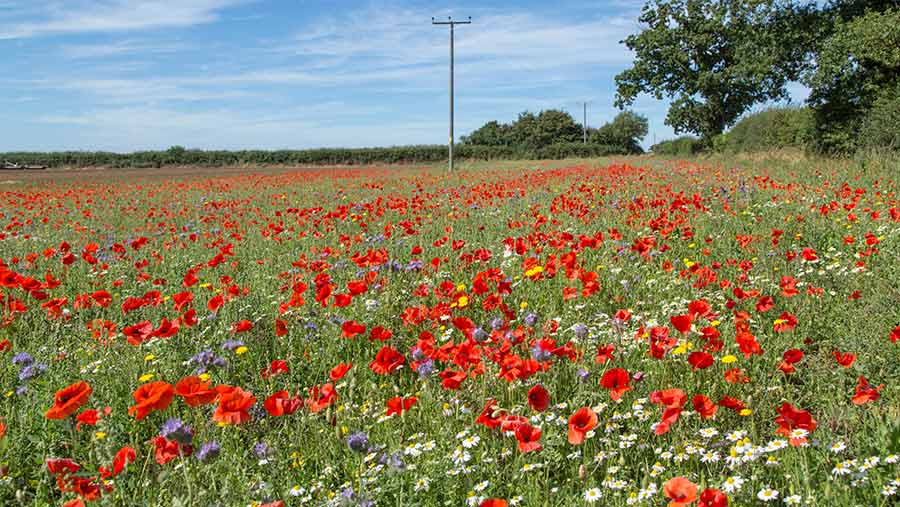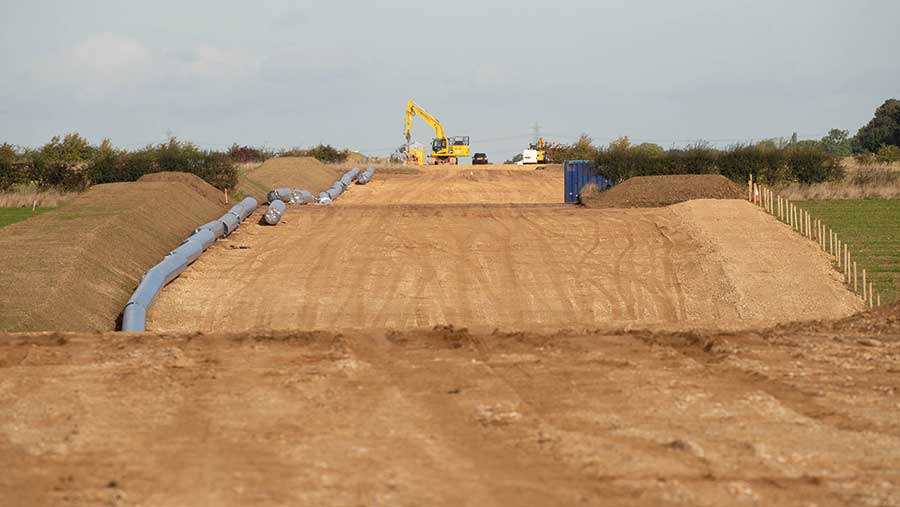Budget analysis: Environmental land use tax consultation is a step forwards
 © Amanda Rose/Alamy Stock Photo
© Amanda Rose/Alamy Stock Photo A consultation on the tax treatment of long-term land use changes for environmental schemes is a step towards clarifying whether 100% agricultural property relief from inheritance tax should be available for such uses.
Alongside the consultation, which was issued in last week’s Budget, is a call for evidence on how payments for ecosystem services should be treated for tax.
Concern remains about how long it will take to achieve a settled inheritance tax (IHT) policy that will give landowners the confidence to sign up to certain aspects of Environmental Land Management (ELM).
See also: Biodiversity net gain – stacking confirmed but questions remain
The consultation makes it clear that the Sustainable Farming Incentive (SFI) is not expected to involve land being taken out of agricultural production and so the tax position of such land is not being considered.
However, where activity involves land use change the Countryside Stewardship and Landscape Recovery Schemes do come within its scope with regard to agricultural property relief (APR) in England.
Time is pressing for clarity on the IHT treatment of many other environmental land uses.
Achieving a 10% biodiversity net gain (BNG) uplift becomes a legal requirement on developers from November this year, while the need for nutrient neutrality measures to offset the phosphate and nitrogen impacts of new development is already holding up the planning process in many areas.

© Gary Naylor
Primary legislation is needed for a change to extend the definition of agriculture for the purposes of IHT relief under such land uses, or to bring in a self-standing clause giving relief.
The consultation runs to 9 June this year, after which the government will consider the responses and formulate policy.
There will be a parliamentary summer recess from 20 July, preceded by several weeks of breaks for Easter, the coronation and Whitsun.
This makes it very unlikely that there will be any decision before late autumn, say observers.
A further complicating factor is the differing pace of policy change in the four nations of the UK, which share a common tax regime.
Business property relief
The consultation states that no changes are planned to business property relief (BPR) which is available at 100% or 50% depending on the circumstances.
However, Ben Taylor of law firm Roythornes says that it is too simplistic to rely on BPR in the gap until the APR position with regard to long-term environmental land use schemes is clarified.
“Some targeted relief is needed,” he says. “BPR at 100% is not a given for every situation and can involve a tax charge up front, whether that is capital gains tax or stamp duty land tax.
“The complicated ownership structures in farming, be that the business or the land itself, the multi-generational aspects, partnerships and possibly the involvement of trusts – these are all aspects which need to be considered by those considering entering these schemes and trying to plan their future.”
Consultation and call for evidence
1. Call for evidence on tax treatment of the production and sale of ecosystem service units.
Tax advisers, industry representatives and the recent Rock Review of tenant farming in England want to see the tax treatment in this area clarified.
The aim of the call for evidence is to understand the commercial operations of these payments and the areas of uncertainty on tax.
2. The consultation itself seeks views on the scope of APR, with the current regime being a potential barrier to some landowners and farmers making long-term land use change decisions from agricultural to environmental use.
Limited provisions were introduced in the past for certain habitat scheme land uses to be classed as agriculture for the purposes of APR, despite the regulations in question banning agricultural production on the land for long periods. One option would be to extend such provision to the new environmental land uses in emerging markets such BNG.
The consultation seeks views on what other agreements (for example BNG, nutrient neutrality) that meet high verifiable standards and have robust monitoring could be added to any list of environmental land management schemes qualifying for APR.
It also raises the question of the challenge of valuing land in environmental uses and how this could be overcome.
The consultation also seeks views on:
- The impact of restricting 100% APR to tenancies of at least eight years, whether any exclusions to this would be necessary and how could these be defined if the government pursued this approach.
- The issue of farming tenants’ access to long-term environmental schemes.
Respond to the consultation
The consultation runs until 9 June 2023. Comments and submissions should be sent to personaltaxconsultations@hmtreasury.gov.uk or write to Personal Tax Team, HM Treasury, 1 Horse Guards Road, London SW1A 2HQ.
Respondents are asked to set out whether they represent a business, an individual or representative body.
Budget measures to promote investment
Capital allowances changes were introduced for companies, giving more generous reliefs (see panel) and bringing criticism from some quarters that this was a very corporate Budget offering little to sole traders and partnerships which still make up the vast majority of farming businesses.
Accountant Sam Kirkham, a partner in the farms and estates team at Albert Goodman says that capital allowances have become very complicated, with a wide variation in rates of relief, depending on the investment and the entity making the investment.
“Therefore, it is even more important to understand the regime and to know what items attract what rate of allowance, so that you are not missing out,” she says.
Advisers also point out that the three-year full expensing measure for companies straddles a period in which there will be a general election.
Capital allowances summary
Companies
A new 100% allowance, referred to as full expensing, for plant and machinery in the year of expenditure, for three years from 1 April 2023 to 31 March 2026.
Plant and machinery expensed in this way must be on the “main rate” list. The kit must be new and unused, it cannot be a car, given to the company as a gift, or bought to be leased out.
Companies continue to get an annual investment allowance (AIA) of £1m for plant and machinery, which can include secondhand equipment
The 50% first year allowance that was due to end on 31 March 2023 was extended for three years and lets companies set off 50% of the cost of other plant and machinery, known as special rate assets, in the year of purchase.
Sole traders and partnerships
These continue to have an AIA of £1m a year, allowing them to offset the full cost of qualifying plant and equipment in the year of expenditure.
Once the AIA limit is reached, then main rate plant and equipment is relived at 18% a year.
Carbon capture pipelines warning

© Tim Scrivener
The £20bn announced in the Budget for carbon capture and storage is likely to increase demand for pipelines across farmland to take carbon out to sea, says Central Association of Agricultural Valuers’ secretary and adviser Jeremy Moody.
“This disruption is already happening in north Lincolnshire and it could become more widespread,” he warns.
The first UK carbon capture power station, Keadby 3 in north Lincolnshire, won planning permission last December.
It will have a generating capacity of up to 910MW and will capture up to 1.5m tonnes of CO2 a year.
The plan is for carbon to be channelled through CO2 pipelines being built to transport emissions from industrial plants across the Humber to storage under the North Sea.
Other budget measures
- 5p/litre petrol and diesel duty cut, due to end in April, remains in place
- Cap on lifetime amount in pensions savings to be abolished
- Tax-free annual allowance for pension contributions increased to £60,000
- Domestic Energy Price Guarantee extended for three months until June. It is expected that this provision will be extended again to allow farming households which take electricity through their business account to receive the £66 a month help, also for those not on the gas grid to receive additional funding in recognition of their higher heating costs
- Childcare support was extended so that most parents will receive up to 30 hours of funded care for children aged nine months to two years (currently only available for three- and four-year olds)
- Freeze on draught beer duty in pubs
Missed opportunities
Energy support: Failure to extend relief under the Energy and Trade Intensive Energy Scheme from 31 March to the horticulture, poultry and pig sectors.
Full expensing: Applies only to companies, as did the 130% super deduction capital allowance which ends on 5 April. Many want this for sole traders and partnerships too.
Structures and Buildings Allowance: Introduced in October 2018, this allows only a 3% a year capital allowance – business interests have argued since its introduction (at 2% initially) that this should be higher.
Green funding: No significant measures were introduced for green investment. Joe Spencer, partner at accountant MHA, says: “Providing the agricultural sector with sufficient incentives to install green energy should be central to the government meeting its net zero targets by 2050.
“Many were hoping the chancellor would go further than he did, specifically at the ‘business end’ of the supply chain. All in all, this was a missed opportunity to really encourage investment in green technology and energy efficient solutions.”
R&D tax credits: Available only to companies – lobbying continues for this to be extended to sole traders and partnerships.
Wine sector: While draught beer duty in pubs is frozen, non-draught alcohol duty will rise by inflation in August, which could put pressure on the UK’s growing wine sector. There had been lobbying in particular for small wine producers to be given additional relief and incentives.
Farming and food workforce: Despite heavy lobbying, the food, hospitality and retail sectors remain excluded from the shortage occupation list which would allow foreign workers to enter the UK, while several construction trades were added to the list. The Migration Advisory Committee is to report again in the autumn on retail, hospitality and food.
